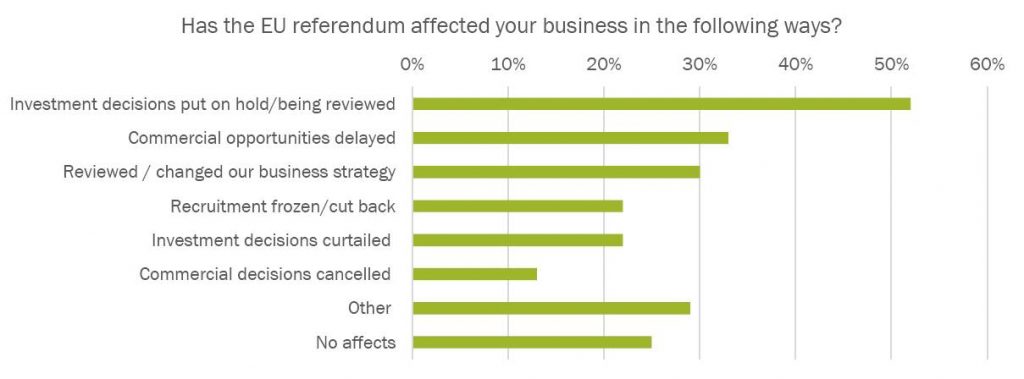More than half of the UK’s health technology companies have put investment decisions on hold following the Brexit referendum, according to a survey seen by Chief-Exec.com.
The Association of British Healthcare Industries (ABHI), who conducted the survey, also found that 54 per cent of their member companies ranked Brexit related issues as the biggest challenge facing their business.
The chief executive of the ABHI, Peter Ellingworth, said on Tuesday that there were 3,000 medical technology companies in the UK, employing about 90,000 people. They had a combined turnover of £17 billion.
“The industry has an expected employment growth of 11 per cent,” he said.
“The sector has been identified as a priority for the UK economy, so we have to make Brexit a success. The survey results will help inform government about what we need – resources, regulations and a constructive UK-EU relationship – to make this happen.”

Credit: Association of British Healthcare Industries
The online survey, completed by 63 of its 250 member companies, found that SMEs were particularly affected by the decision to leave the European Union. However, they were more open to opportunities in trading with non-EU countries. For larger companies it is still too early to speculate on the opportunities that may emerge in a post-Brexit UK.
Almost all of the companies surveyed (97 per cent) said they wanted to retain their dependence on European regulations which control the safety and efficacy of health technology products.
The ABHI has contributed to the work of the Association of Pharmaceutical Industries (ABPI) and the Biosciences Industry Association (BIA) led EU Life Sciences Transition Programme. Organisations across the broader life sciences sector continue to collaborate on areas of mutual interest while exploring more specific opportunities unilaterally.
The Brexit-related uncertainty over many key issues for the life sciences sector creates an important role for all industry associations. Being a source of information and intelligence as well as providing the link between industry, government and the NHS is central to the ABHI role. This allows networks of members who share common concerns to co-ordinate an industry consensus.
Yet, there is one UK asset that has still to find its full value, Mr Ellingworth said.
“The NHS is an amazing organisation both in terms of the health care it can deliver and in the multiple ways it can support UK industry to develop better, safer health technologies that will improve the care the service is able to provide to patients.
“While the NHS is challenged by capacity issues that threaten its normal clinical services, there is limited opportunity for innovation and collaboration with industry. Progress here would make the UK a much more attractive place for health technology development.”
by John Egan




